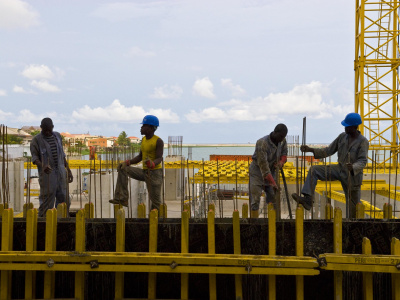Promising land to investors
On 3 June 2015, more than 100 African and international farmers organisations, unions and civil society organisations released a statement calling on the G7 and African governments to stop supporting the New Alliance. There are indeed serious concerns regarding this initiative. As highlighted in a recent ActionAid report, the New Alliance is further increasing the risk of rural communities losing their access to and control over land to large investors. This happens mainly through policy commitments on land titling and land reform that go against the spirit of the UN Voluntary Guidelines on land tenure adopted three years ago by governments, international organisations, the private sector and civil society organisations. 1.8 million hectares of land have been offered to foreign investors in Malawi, Nigeria, Senegal and Tanzania as part of the commitments made by those countries under the New Alliance. In Malawi alone, a country where one out of five people is undernourished, one million hectares are being offered to investors, which equates to 26% of the country’s total arable land.
In some of those countries, land titling is expressly presented as a way of allocating more land to investors – rather than protecting the legitimate land tenure rights of local communities, as requested under the UN Voluntary Guidelines on land tenure. ActionAid’s report also shows that some large companies involved in the New Alliance have already been accused of taking part in land grabs in some countries.Ignoring the real African food producers
Small-scale food producers are collectively the leading investors in agriculture, estimated to produce 70% of the food in Africa. Addressing food and nutrition insecurity on the continent requires the full participation of small-scale food producers. Local control over natural resources, seeds, land, water, forests, knowledge and technology is crucial for small-scale women and men farmers, pastoralists, livestock farmers, fisherfolk and hunter-gatherer societies. The New Alliance completely ignores that dimension, since it has been elaborated by donor governments and companies, without participation of those who are supposed to benefit from that initiative – smallholder farmers.
The G8 countries and the European Union committed US$5.9 billion to the New Alliance. Those countries should not encourage the large-scale transfer of legitimate land tenure rights to investors. Therefore, and because farmers themselves must be central to strategies aimed at increasing the amount and effectiveness of agricultural investment, policy commitments under the New Alliance should be reviewed in each country by a multi-stakeholder platform that includes small-scale food producers’ organisations and marginalised groups. The free, prior and informed consent of all communities affected by land transfers should be a pre-condition for all projectssupported by G8 countries and the EU and this safeguard should not be confined to indigenous people, as is currently the case under the New Alliance. This means communities could refuse a project if, once fully informed, they consider it will not benefit them and that alternative policies or projects would be more relevant. Similar safeguards should also be applied to projects supported by the European Investment Bank for the African, Caribbean and Pacific states (ACP) in the field of agriculture under their 2014-2016 Strategy.Understanding the multi-functionality of agriculture
Today, the link between growth, poverty alleviation and reduction of inequalities is not automatic anymore. As stressed by UNCTAD in their Trade and Environment Review 2013, “The fundamental transformation of agriculture may well turn out to be one of the biggest challenges, including for international security, of the 21st century (…) The required transformation is much more profound than simply tweaking the existing industrial agricultural system. Rather, what is called for is a better understanding of the multi-functionality of agriculture, its pivotal importance for pro-poor rural development and the significant role it can play in dealing with resource scarcities and in mitigating and adapting to climate change”.
This is why donors need to prioritise investment in smallholder farmers as they offer the greatest potential to drive equitable development in countries and climate resilient sustainable agriculture. They should in particular support the development of local infrastructures, supply chains and markets that are adapted to their needs and opportunities, rather than pushing initiatives such as the New Alliance that aim at adapting small-scale food producers to the needs of large-scale agribusiness companies. The New Alliance has failed to protect the rights of poor people; it must be replaced by initiatives designed with small-scale food producers and that are genuinely aiming at supporting them. See actionaid.org for more on the above topic. About the authors Isabelle Brachet is the Europe advocacy coordinator of ActionAid International. Specialised in human rights law, Isabelle joined the EU office of ActionAid at the end of 2013. She contributes from a EU perspective to ActionAid global campaigns against land grabs and for tax justice. Antoine Bouhey is the coordinator of ActionAid International’s #LandFor campaign, a campaign supporting rural communities in defending their rights against land grabs in more than 15 countries.This article was published in GREAT Insights Volume 4, Issue 4 (June/July).


